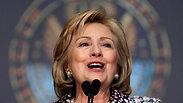
Former Secretary of State Hillary Rodham Clinton
צילום: רויטרס
Clinton warns new Iran sanctions could upend talks
Former US secretary of state Clinton supports Obama's position on new congressional Iranian sanctions, saying that 'we must give diplomacy a chance, while keeping all options on the table'
Former Secretary of State Hillary Rodham Clinton is warning Congress that new unilateral sanctions against Iran could upend sensitive international negotiations over its nuclear development, imploring lawmakers to work with the Obama administration in presenting a unified front to Tehran.
Echoing President Barack Obama's deep concerns about another round of tough economic penalties, Clinton said any congressional action could undercut U.S. work with its allies as well as American influence with Russia and China in forcing Tehran to negotiate after years of inconclusive talks.
"Now that serious negotiations are finally under way, we should do everything we can to test whether they can advance a permanent solution," Clinton said. "As President Obama has said, we must give diplomacy a chance to succeed, while keeping all options on the table."
Related stories:
- Obama promises to veto Iran sanctions, support Israel
- Rags to riches to ruin: Iranian sanctions-buster who ended up in jail
- Who will be main beneficiary of Iran sanctions lift?
Clinton offered her assessment in a three-page letter to Sen. Carl Levin, the chairman of the Armed Services Committee. Levin's office released the letter, dated Jan. 26, on Sunday.
Levin and several other committee chairmen have expressed a willingness to hold off on sanctions to give diplomatic efforts a chance. However, 59 Republicans and Democrats back legislation to impose a new round of penalties on Iran, maintaining that crippling economic sanctions forced Tehran to make concessions.
The legislation, sponsored by Sens. Bob Menendez and Mark Kirk would blacklist several Iranian industrial sectors and threaten banks and companies around the world with being banned from the U.S. market if they help Iran export any more oil. The provisions would only take effect if Tehran violates the six-month interim deal or lets it expire without a comprehensive nuclear agreement.
Iran agreed in November to slow its uranium enrichment program to a level that is far below what would be necessary to make a nuclear bomb. It also agreed to increased international inspections to give world leaders confidence that it is not trying to build weapons in secret.
In exchange, the US and five other nations - Britain, Germany, France, Russia and China - agreed to ease an estimated $7 billion worth of international sanctions against Iran's crippled economy for a six-month period while negotiators try to broker a final settlement.
Iran has long maintained that its nuclear program is for peaceful purposes.
Clinton said the intelligence community has said new sanctions could undercut the chances for a comprehensive nuclear agreement with Iran.
"I share that view. It could rob us of the diplomatic high ground we worked so hard to reach, break the united international front we constructed and in the long run, weaken the pressure on Iran by opening the door for other countries to chart a different course," said the former New York senator and possible 2016 presidential candidate.
In his State of the Union address this past week, Obama repeated his threat to veto any new Iran sanctions if Congress passes legislation.
Clinton, who said she repeatedly backed Iran sanctions during her eight years as senator, cautioned lawmakers.
"If the world judges - rightly or wrongly - that negotiations have collapsed because of actions in the United States Congress, even some of our closest partners abroad - to say nothing of countries like Russia and China - may well falter in their commitment. And without help from our partners in enforcing them, any new measures we put in place will not achieve maximum impact," Clinton said.
Levin, who had written to Clinton Jan. 16 seeking her views, said her letter "is another strong signal to Congress that we should not take any legislative action at this time that would damage international unity or play into the hands of hard-liners in Iran who oppose negotiations."










